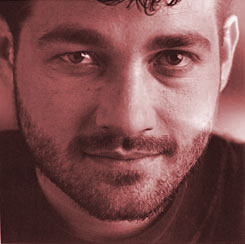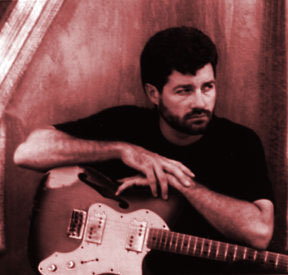
|
||
| Volume III, Issue III | Autumn 2004 | |
| Autumn 2004 Home Page |
| Culture/ Technology |
| Fiction |
| Music |
| Poetry |
| Theater |
| About / Contact |
| Archive |
| Current Home Page |
True to his N'Awlins school
Tab Benoit on growing up and living in America's most fertile musical ground
 Cajun bluesman Tab Benoit had just completed sessions for his upcoming CD, working title "Portrait Of New Orleans," and he was on a roll. It's hard to think of another musician so clearly possessed of a Crescent City-centric mindset as Benoit. The affable guitar maestro was on the line, gushing over the virtues of his lifelong environs with the enthusiasm of four-year-old visiting Disneyland for the first time. Tab wanted to talk N'Awlins, and there would be no stopping him.
Cajun bluesman Tab Benoit had just completed sessions for his upcoming CD, working title "Portrait Of New Orleans," and he was on a roll. It's hard to think of another musician so clearly possessed of a Crescent City-centric mindset as Benoit. The affable guitar maestro was on the line, gushing over the virtues of his lifelong environs with the enthusiasm of four-year-old visiting Disneyland for the first time. Tab wanted to talk N'Awlins, and there would be no stopping him.
"You don't find a lot of regional sounds anymore," he said in a humid drawl. "It used to be that every region had its own sound. Well, New Orleans and Louisiana in general still have that, and it just rubs off on me. I've had producers in the past trying to get me away from it, but it's there, it must be in the water or something, 'cause I can't just turn it off, I feel it that way. What I record has to be representative of what I am, it has to have a natural feeling and pull in what I grew up with."
What Benoit grew up with is exposure to so much musical treasure it seems he's run out storage space in his brain to keep inventory of it all. In discussing the heroes, traditions and creative produce of his home state, Benoit – an old-souled 37, but chronologically green as a sugar pea by the venerable standards of his region – indulges in a rambling oratory worthy of an over-caffeinated college professor.
"The thing with New Orleans musicians is that a lot of the old-timers stayed here, they didn't travel a lot, so I got to see a lot of them live," he explains. "I'd see the Neville Brothers and the Radiators, and I'd go down to Bourbon Street and see all the blues bands playing all day and all night. And every wedding, church fair and festival I ever went to had different bands – all kinds of music, a lot of what they call swamp-pop, variations on what Fats Domino and those guys were doing when they started rock & roll. There's so many musical and cultural influences around here ... Cajun, European folk music, there's a Caribbean influence in there, Indian influence.
"Other than Bourbon Street – which has become like Mardi Gras all year 'round – New Orleans is the same as ever. You can still go out every night of the week and see legendary musicians; Snooks Eaglin, Ellis Marsalis and those guys are still out there forging new music, educating the young guys. There's still school-kids in New Orleans just learning to play Dixieland jazz, being taught by the masters, the people who were there when it was formed. That's what's great about New Orleans."
Since his '92 debut, Benoit has been tagged in some quarters as the next blues guitar god; the successor to Stevie Ray Vaughan's mantle. He's been compared to everyone from Jimi Hendrix to Alberts King and Collins, and he can make his Telecaster scream with the best of 'em when so disposed. However, since hooking up with quality-conscious, roots-specialty label Telarc Records in '99, Benoit's releases have evinced a more down-home sensibility, which he stresses is his true muse.
"Everybody was looking for the next Stevie Ray Vaughan, so they kind of pushed me in that direction," he recalls. "That's understandable – it was a big loss and everybody misses him, but that wasn't the direction I wanted to go into. I loved all those guys, and I used to go see Albert King and Albert Collins whenever they played, it just wasn't where I wanted to be. In fact, the guy I really listened to the most, the one that really pulled me into the guitar, was John Lee Hooker."
For the past two years, Benoit has also been involved in a blues-rock-oriented side project with Telarc label-mate Jimmy Thackery. More of an unabashed shredder, Thackery coaxes a showier brand of heat from Benoit, as the tandem has recorded two albums that feature a friendly but unmistakably dueling sensibility.
 "We first met about 12 years ago and we just hit it off," Benoit says of his part-time-partner. "We started jamming together at this little bar underneath a hotel we were staying at. People started coming in and it got so packed we had to kill the jam. After that we were like, 'Hey, this is pretty cool, people might like this!' We're also good friends. We enjoy hanging out together and making each other laugh. Doing this was something we had in mind for like 10 years, and Telarc finally gave us the opportunity to put it together."
"We first met about 12 years ago and we just hit it off," Benoit says of his part-time-partner. "We started jamming together at this little bar underneath a hotel we were staying at. People started coming in and it got so packed we had to kill the jam. After that we were like, 'Hey, this is pretty cool, people might like this!' We're also good friends. We enjoy hanging out together and making each other laugh. Doing this was something we had in mind for like 10 years, and Telarc finally gave us the opportunity to put it together."
Whether playing sticky swamp-funk a la Slim Harpo or indulging in rave-ups derived from the Hendrix canon, the one thing Benoit has little patience for is a flavor-of-the-month sensibility applied to the blues. The trendy Fat Possum sound – classic blues with hip hop beats imposed upon it – leaves Benoit cold. While he's hardly what one would deem a moldy-fig purist, Benoit remains, to his heart and soul, a proud traditionalist.
"Blues has never been a fad," he stressed. "It's never been the 'in' thing to do, and it never will be. Blues is real music being played by real musicians, it has a mystery to it, and I think that's important. Technology doesn't have that, some drum loop or fancy effect doesn't have that. It comes down to the emotion of it, what it makes you feel.
"But you don't have to worry about me, I'm gonna go down doing it the same way as always – live and in the moment. I don't care to sell millions of records. I could play music sitting on my damned front porch for the rest of my life and be happy."
![]()
Autumn 2004 Music Section | Autumn 2004 Main Page
Current Music Section | Current Home Page
Copyright ©
Reprinted by permission of author, who retains all copyright and control.